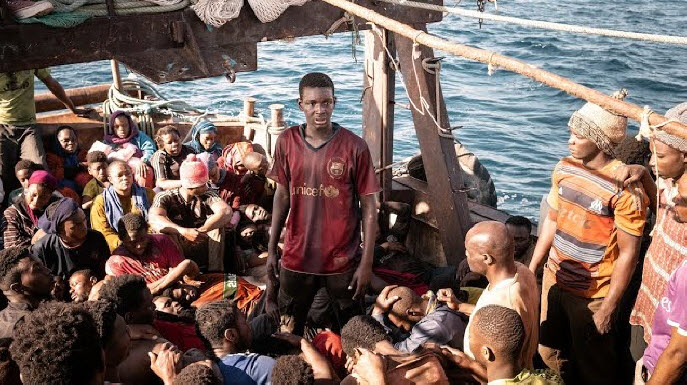“Io Capitano”, which was recently nominated for Best International Film Oscar, follows one arduous journey across the African continent taken by the two young main characters at the center of the story. What we are going to see here is as grim and harrowing as you can possibly expect, but the movie steadily holds our attention to the end thanks to its skillful direction as well as its powerful immigrant drama, and you may also care about whatever may happen next after the end of the story.
The early part of the film is set in a shabby neighborhood of Dakar, Senegal, and we are introduced to a teenage boy named Seydou (Seydou Sarra) and his cousin/best friend Moussa (Moustapha Fall). As often working day by day, they have gathered a considerable amount of cash for going to Italy together someday, and both of them are hopeful about how much they will earn there for their families once they get there, though they are sternly warned about how things can be quite bad for them if they ever try to go there.
In the end, these two boys leave their neighborhood in one early morning, and that is the beginning of their journey across the African continent. Along with many different Africans as eager to go to Europe as they are, they will go across a number of central/northern African countries including Niger and Libya, and it looks like everything will go well for them as they eventually get out of their country with their fake passports.
What follows next is not so far from those heartbreaking news reports we come across from time to time these days. After managing to cross over the border between Mali and Niger, Seydou and Moussa soon come to face the harsh reality waiting for them, and they and other illegal immigrants are all forced to travel across the Sahara Desert without much help or assistance at all. Not so surprisingly, that is just the prelude to much more predicaments to come, and the movie phlegmatically observe a series of chilling moments of cruelty and savagery inflicted upon the boys and many unlucky folks around them.
The movie certainly could be devolved into your typical misery porn at any point, but it handles the story and characters with enough care and respect at least, and we become more emotionally involved into Seydou and Moussa’s struggles along the story. While they surely come to learn and experience more of how the world outside can be pretty bad for numerous illegal immigrants like them, both of them do not give up their hope and dream nonetheless even during the most despairing moments of their journey, and there is some poignancy from how desperately they try to stick together via their strong friendship.
And it is also touching to see how kindness and compassion are still possible despite this harsh reality. In case of one guy Seydou happens to be associated with, he willingly takes Seydou under his wing and then helps Seydou a lot without asking for anything from Seydou, and that is one of the most moving moments in the film. Later in the story, Seydou finds himself tasked with a serious task which may overwhelm him at any point, but he goes forward anyway despite his fear and anxiety, and many others around him stick around him to some degree for their eventual survival.
The movie is also quite impressive in terms of mood and details, and director/co-writer/producer Matteo Garrone, an Italian filmmaker who deservedly received the Silver Lion award when the film was premiered at the Venice International Film Festival in last year, and his crew members including cinematographer Paolo Carnera did a commendable job of immersing us more into Seydou and Moussa’s challenging odyssey. While it is constantly filled with a considerable amount of realism and verisimilitude, the movie occasionally provides some stunning visual moments whenever the camera looks at those vast landscapes shown along the boys’ journey, and it also even tries a bit of magic realism at times, which is somehow mixed fairly well with its gloomy realism on the whole.
Above all, the movie is equipped with a beating human heart at the center of its story, which is none other than the unadorned strong lead performance by Seydou Sarr, who richly deserves the Marcello Mastroianni Award he garnered at the Venice International Film Festival. He and his co-star Moustapha Fall are effortless as quickly establishing the bond between their characters early in the story, and we come to understand more of how much Seydou is driven by his friendship with Moussa as well as the need to survive. Especially during the last act unfolded in the middle of the Mediterranean Sea, Sarr is quite electrifying while his character swings back and forth between sheer despair and determination, and it goes without saying that his character certainly earns the title of the film in the end.
In conclusion, “Io Capitano” is another interesting work from Garrone, who drew my attention for the first time with his unforgettable crime drama film “Gomorrah” (2008). This is surely a tough stuff to watch, but it has enough human qualities to engage and then move us besides its top-notch technical aspects, and it certainly qualifies as a good movie which can function as an empathetic window to the life of many people different from most of us. In short, this is one of the better films I watched during the first several weeks of this year, and its many human moments will linger on your mind for a long time after it is over.











Pingback: My Prediction on the 96th Academy Awards | Seongyong's Private Place
Pingback: 10 movies of 2024– and more: Part 2 | Seongyong's Private Place